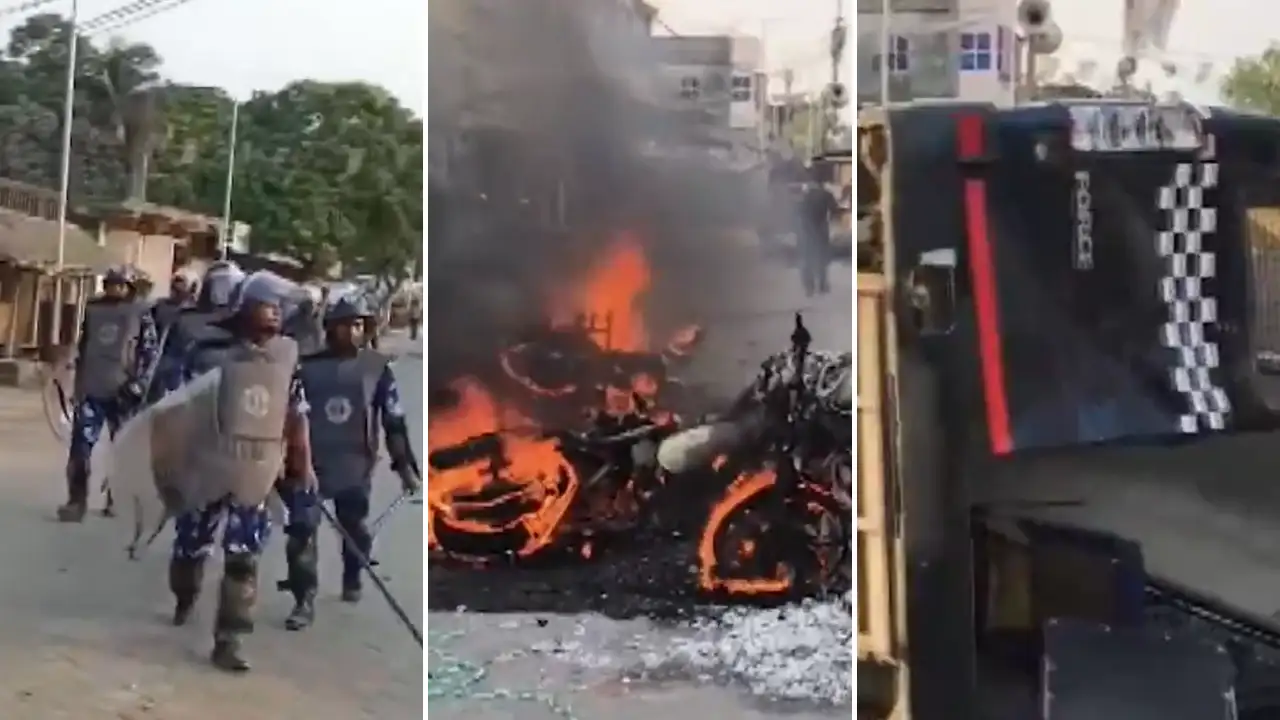West Bengal witnessed fresh political and communal unrest on April 15 as violent clashes broke out in South 24 Parganas’ Bhangar area between supporters of the Indian Secular Front (ISF) and the police. The violence occurred during protests against the recently enacted Waqf (Amendment) Act, which critics allege undermines minority rights and centralises control over Waqf properties.
According to reports from PTI and IANS, the confrontation resulted in multiple injuries to civilians and police personnel alike, with several police vehicles set ablaze by protesters. The situation quickly escalated, prompting the deployment of a large police force and the declaration of a high alert in the region. Traffic along the Basanti Highway was brought to a halt for several hours due to road blockades and the sit-in protest by demonstrators.
Later that evening, West Bengal Police issued a statement assuring that the situation in Bhangar had been brought under control. They confirmed that criminal cases had been registered against individuals involved in arson and violence. The Kolkata Police also took to social media to caution citizens against believing or spreading unverified information, warning that legal action would be taken against anyone found circulating rumours or misinformation.
VIDEO | West Bengal: Tension in South 24 Parganas’ Bhangar as Indian Secular Front (ISF) workers clashed with city police. They also set a van ablaze. More details awaited.
(Full video available on PTI Videos – https://t.co/bnF8OnGu37) pic.twitter.com/fk17Jufpl3
— Press Trust of India (@PTI_News) April 14, 2025
The Flashpoint: Why did the clashes occur?
The tension began when ISF supporters attempted to travel from Bhangar and neighbouring areas like Minakhan and Sandeshkhali to attend a rally in central Kolkata’s Ramlila Maidan. The rally, which was to be led by ISF leader and Bhangar MLA Naushad Siddique, aimed to protest against the Waqf (Amendment) Act. However, the rally lacked formal police permission.
Police intervened near Bhojerhat on the Basanti Highway to prevent the large crowd from proceeding, citing law and order concerns. Protesters, however, accused the police of unjustified repression and argued that their right to peaceful assembly was being violated. When the crowd attempted to breach police barricades, clashes broke out. The situation quickly deteriorated as some demonstrators resorted to stone-pelting and reportedly set fire to police vehicles. A number of officers sustained injuries in the melee.
Despite the chaos, Siddique eventually addressed the rally at Ramlila Maidan, delivering a fiery speech criticising both the BJP-led central government and the ruling Trinamool Congress (TMC) in the state. “This law is not just an attack on Muslims, it is an assault on the very spirit of the Constitution. It must be withdrawn,” he said. He accused the BJP of attempting to engineer communal polarisation and slammed the TMC for suppressing legitimate dissent. “If the Chief Minister claims this Act will not be implemented in Bengal, why are her police blocking our peaceful protest?” Siddique asked, as per PTI.
He also suggested that the unrest was being used to divert public attention from the Supreme Court’s recent cancellation of over 25,000 teaching jobs in the state, a scandal that has caused considerable political embarrassment for the TMC government.
The ISF, a relatively new political force in West Bengal led by the Siddique family of Furfura Sharif, has positioned itself as a defender of minority rights and has sought to channel growing discontent among Muslims in the state. The party’s increasing assertiveness has brought it into direct confrontation with both the ruling TMC and the BJP, which dominate Bengal’s political landscape.
Parallel violence to Murshidabad
The violence in Bhangar came on the heels of communal unrest in parts of Murshidabad district, including Suti, Dhulian, and Jangipur. Protests against the Waqf (Amendment) Act turned violent on April 11, after a bout of previous incident of violence that took place on April 8, leading to the deaths of three people. Several others were injured, and property was damaged in what police sources described as targeted communal violence, with reports emerging of attacks against Hindu communities.
Over 200 arrests have been made in connection with the Murshidabad violence, a senior police official confirmed. Additional Director General (Law & Order) Javed Shamim stated that peace had been largely restored in affected pockets of Murshidabad and Malda districts. Shops and businesses have begun reopening, and senior officials remain deployed to monitor the situation. “Route marches are being carried out regularly, and the police presence will continue to ensure order,” he said, as per The Times of India.
In light of the unrest, internet services have been suspended in certain areas to prevent the spread of inflammatory rumours and misinformation. Authorities have also started the process of facilitating the safe return of people displaced by the violence to their homes. Certain claims have been doing rounds that 400 Hindu families have fled from West Bengal.
Detailed reports on the violence in Murshidabad may be read here and here.
Related:
22 arrested, internet suspended as Murshidabad recovers from Waqf Act protest violence

